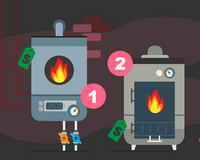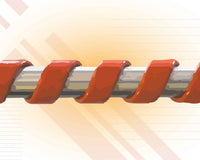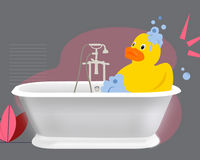The only thing more troubling than being in hot water is being out of it. Only a mobile home water heater can prevent this tragedy — unless you haven’t installed the right type to suit your usage needs. Today’s mobile home water heaters come in a variety of sizes and configurations, some of which can be fairly advanced. For the purposes of this article, we’ll focus on the two most common — gas and electric hot water tanks — and their pros and cons.
What’s the difference between mobile home hot water tanks and a tankless water heater?
All water heaters need a fuel source, typically gas or electricity (sometimes solar or other alternatives) — the difference is in how they utilize it. Tank water heaters store heated water in reserve, while tankless models heat water continuously and on-demand. Although tankless are gaining steam amongst traditional homeowners, they come with certain stipulations that make their installation illegal in some jurisdictions.
Therefore, tank electric and gas remain the go-to option. When people shop for “electric water heater” or “gas water heater,” this is what they usually mean. It’s important to note that manufactured home water heaters are NOT interchangeable with those designed for single-family homes. They are by necessity much smaller (most often 30 gallons), as they have to squeeze into a designated closet either inside or outside the housing unit. In contrast, conventional home water heaters are sometimes twice as big.
Pros and Cons of Electric Mobile Home Water Heaters
An electric water heater uses an electrical supply to feed heating elements that warm the surrounding water in the tank. Each (upper and lower) is thermostatically controlled.
Pros of Electric
- Electric mobile home water heaters usually cost less upfront.
- They’re generally easier to install than their gas-fueled counterparts, although you may need to connect a new power supply if one does not already exist.
- They are more efficient — most of the power that goes into the system stays in the system, as there is no need for venting.
- They’re safer overall than gas mobile home water heaters, which can leak or even explode in rare circumstances.
- Electrical power is almost universally accessible, which means this is an option for almost every mobile home owner.
Cons
- Electric mobile home water heaters take longer to warm up.
- They have lower recovery rates, which means they are slower at replacing heated water within a given time frame.
- They’re unusable during power outages.
- Electricity is more expensive as a fuel source in most areas.
Pros and Cons of Gas Mobile Home Water Heaters
Gas water heaters are by nature more complex than electric models. Using a physical phenomenon known as convection, dense cold water begins to rise toward a hot water discharge pipe as it’s heated by a gas burner fed by a gas line below. An exhaust flue vents the byproducts out of the housing unit.
Pros
- Lower monthly energy costs on average.
- Superior first-hour rating (FHR) to electric water heaters — in other words, they can get more water heated up more quickly.
- They’re available in energy-efficient models.
- They’re immune to power outages (granted they do not have an electric igniter).
Cons
- They cost more to install upfront, due to the need for venting.
- There is more maintenance involved.
- If not properly installed or maintained, the hazards mentioned previously (carbon monoxide poisoning, fires, or explosions) could come to bear.
- They are less eco-friendly.
Conclusion
Although more advanced setups are available, a tank gas or electric mobile home water heater will be sufficient for the needs of most mobile home owners. For the best savings upfront, check Star Mobile Home Supply’s inventory of electric and gas tank mobile home water heaters.






